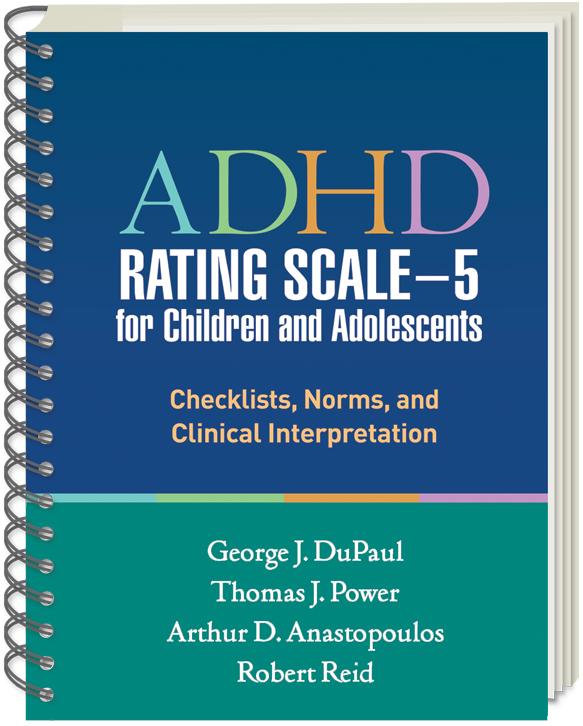Please specify the quantity of product(s).



ADHD Rating Scale—5 for Children and Adolescents Checklists, Norms, and Clinical Interpretation
| Item | Product | Price | QTY |
|---|---|---|---|
| 32001 | ADHD Rating Scale-5 for Children and Adolescents | $195.00 |
Grounded in more than 20 years of research, this valid, reliable, easy-to-administer instrument is widely used by mental health, educational, and medical practitioners in screening, diagnosis, and treatment evaluation. Parent questionnaires on home behaviors (English and Spanish) and teacher questionnaires on classroom behaviors are keyed to DSM-5 diagnostic criteria for attention-deficit/hyperactivity disorder (ADHD). Each scale takes just 5 minutes to complete and comes in both a child (5-10) and adolescent (11-17) version, with developmentally appropriate symptom descriptions. Complete instructions are provided for scoring and interpretation, including separate scoring profiles for symptoms and impairments in boys and girls.
New to This Edition:
- Updated for DSM-5.
- Separate adolescent versions of both home and school rating scales.
- Includes functional impairment items linked to each symptom dimension (inattention symptoms and hyperactive-impulsive symptoms).
- Full analysis of the revised scale's psychometric properties.
QUICK VIEW
What does it do?: Quickly determines the frequency and severity of ADHD symptoms and impairments.
Age Range: 5-17
Administration Time: 5 minutes for each scale.
Format: Parent-report and teacher-report rating scales (includes parent forms in English and Spanish).
Cost of Additional Forms: No cost—purchasers get permission to reproduce the forms and score sheets for repeated use.
Includes Permission to Photocopy:
Enhancing the convenience and value of the ADHD Rating Scale-5, the limited duplication license allows individual purchasers to reproduce the forms and score sheets for use with their clients or patients, yielding considerable cost savings over other available scales. The large format and sturdy wire binding facilitate photocopying.
Age range: 5-17.
Rating Scales and Scoring Sheets
ADHD Rating Scale-5, Home Version: Child (English)
ADHD Rating Scale-5, Home Version: Adolescent (English)
ADHD Rating Scale-5, Home Version: Child (Spanish)
ADHD Rating Scale-5, Home Version: Adolescent (Spanish)
ADHD Rating Scale-5, Home Version: Symptom Scoring Sheet for Boys
ADHD Rating Scale-5, Home Version: Symptom Scoring Sheet for Girls
ADHD Rating Scale-5, Home Version: Impairment Scoring Sheet for Boys
ADHD Rating Scale-5, Home Version: Impairment Scoring Sheet for Girls
ADHD Rating Scale-5, School Version: Child
ADHD Rating Scale-5, School Version: Adolescent
ADHD Rating Scale-5, School Version: Symptom Scoring Sheet for Boys
ADHD Rating Scale-5, School Version: Symptom Scoring Sheet for Girls
ADHD Rating Scale-5, School Version: Impairment Scoring Sheet for Boys
ADHD Rating Scale-5, School Version: Impairment Scoring Sheet for Girls
Technical Information
The ADHD Rating Scale–5: Home Version and School Version are rating scales based on the diagnostic criteria for ADHD as described in the fifth edition of the Diagnostic and Statistical Manual of Mental Disorders (DSM-5). Both versions of the ADHD Rating Scale–5 consist of two symptom subscales, Inattention (9 items) and Hyperactivity–Impulsivity (9 items), as well as a Total Scale (18 items). In addition, the ADHD Rating Scale–5 assesses six domains of impairment that are common among children with ADHD: relationships with significant others (family members for the home version and teachers for the school version), peer relationships, academic functioning, behavioral functioning, homework performance, and self-esteem. When using the ADHD Rating Scale–5, respondents complete each set of impairment items twice, first after rating the inattention symptom items and again after rating the hyperactivity–impulsivity items. The Home Version of the scale is available in English and Spanish. Both versions of the ADHD Rating Scale–5 have separate forms for children (ages 5–10 years) and adolescents (ages 11–17 years) that incorporate age-appropriate symptom descriptions as per DSM-5. The normative sample included 2,079 parents, each of whom rated one child in their family, and 1,070 teachers, each of whom rated one boy and one girl randomly selected from their classrooms. The demographic characteristics of the normative sample for both the home and school versions of the scale closely correspond with 2013 estimates of U.S. census data. Scoring templates are provided that convert raw scores to percentile scores as a function of child gender and age group (5–7, 8–10, 11–13, 14–17 years).
Reliability
The internal consistency of symptom ratings for the Inattention, Hyperactivity–Impulsivity, and Total scales was high; alpha coefficients for these scales for both the Home and School versions and for both age groups (child and adolescent) ranged from .89 to .96. Test–retest reliability over approximately 6 weeks across the three symptom factors ranged from .90 to .93 for the School version and from .80 to .87 for the Home version. Test–retest reliability for the six impairment domains ranged from .62 to .88 for the School version and from .62 to .90 for the Home Version.
Validity
The factorial validity of the ADHD Rating Scale–5 was examined by confirmatory factor analyses, which strongly supported the expected two-factor structure (Inattention, Hyperactivity–Impulsivity) for both parent and teacher symptom ratings, as well as a six-factor structure for parent and teacher ratings of impairment, with each factor (consisting of two items) corresponding with one of the six domains of impairment assessed. Concurrent validity was demonstrated by the pattern of correlations between subscales on the ADHD Rating Scale–5 and corresponding scores on the Conners 3 parent and teacher rating scales, the Impairment Rating Scale rated by parents and teachers, direct observations of academic engaged time and off-task behavior, and samples of student classwork. The predictive validity and clinical utility of the scale was demonstrated by logistic regression analyses and predictive power statistics examining the ability of scores on the symptom dimensions to predict ADHD diagnostic status, as determined by a best practice multimethod assessment battery.